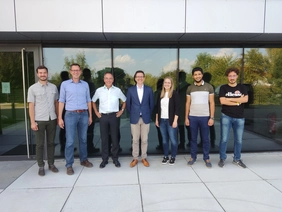Together with Mr. Eichenseher and his colleague Mr. Schreiner, the InES researchers used evaluated energy data to exchange ideas on how to further improve the overall balance of energy production and demand of the office building. By optimising the operation of an ice storage tank as a heat source for the heat pump and the building's shading systems, the use of additional systems such as a compression chiller or electric auxiliary heaters should be avoided. The head of InES, Prof. Zörner, emphasised that the office building is a very positive example of the design of a building taking into account aspects of climate protection, which has also received several awards in recent years.
During the meeting, the current InES guest researchers Karem Chatti and Lazher Mejdi from Tunisia also presented their evaluation of last year's measurement data from the charging stations for electric vehicles at the building of the company Eichenseher Ingenieure GmbH. Together, they discussed anomalies and developed further questions.
The two Tunisian researchers are currently in Germany for a five-month stay as part of the REMO project (Renewable Energy-based E-Mobility in Higher Education), which is funded by the Federal Ministry for Economic Cooperation and Development. Their scientific work focuses on the development of intelligent charging infrastructure using artificial intelligence. The researchers will then transfer the knowledge gained in Germany to the Tunisian context.
Details on all other research projects as well as its Industrial Energy Systems research area can be found on the InES website: www.thi.de/go/energy


![[Translate to English:] Logo Akkreditierungsrat: Systemakkreditiert](/fileadmin/_processed_/2/8/csm_AR-Siegel_Systemakkreditierung_bc4ea3377d.webp)








![[Translate to English:] Logo IHK Ausbildungsbetrieb 2023](/fileadmin/_processed_/6/0/csm_IHK_Ausbildungsbetrieb_digital_2023_6850f47537.webp)


